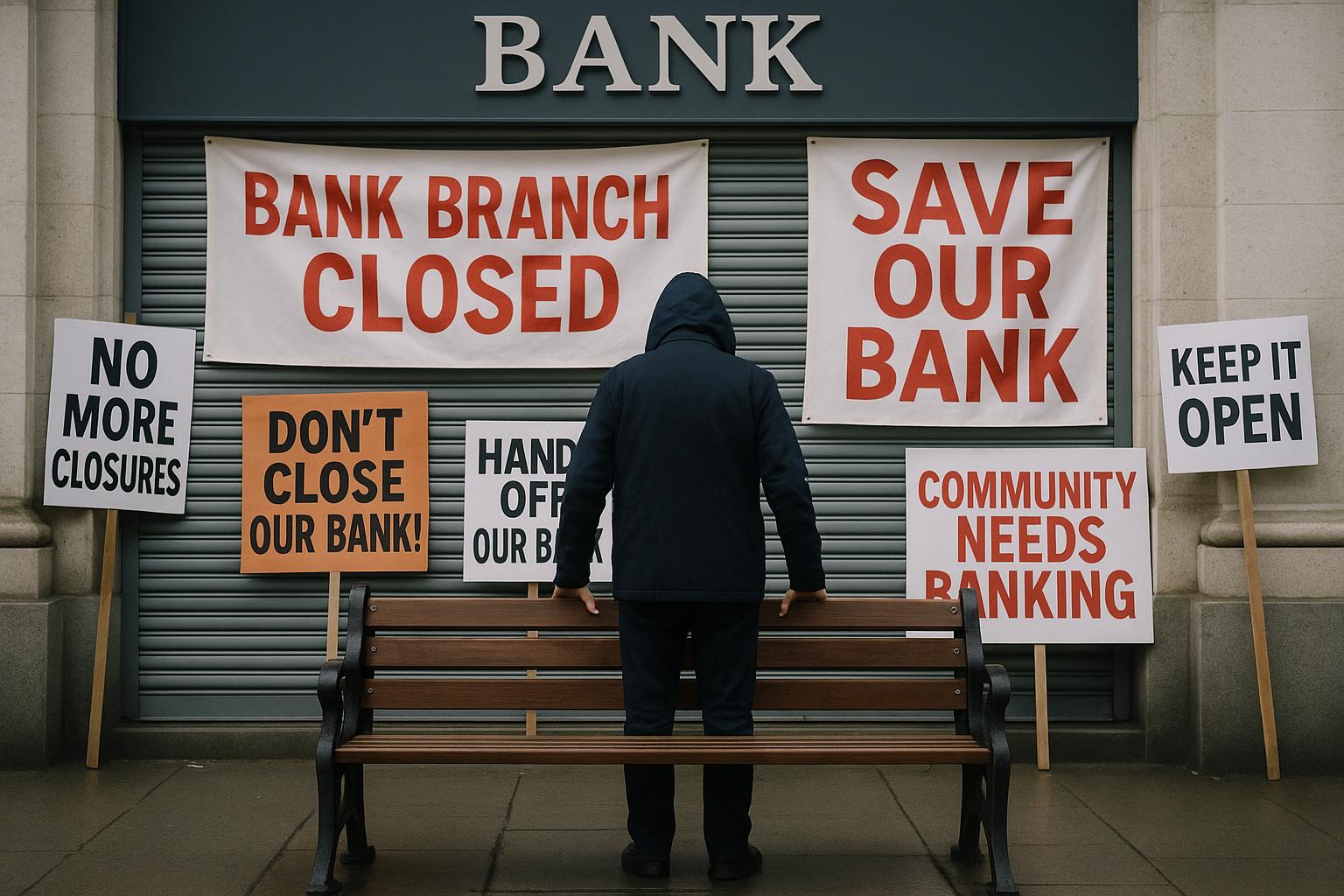Residents of New Addington rally against the planned closure of their local Lloyds Bank branch, highlighting the broader issue of dwindling physical banking services and the impact on vulnerable populations across the UK.
Residents of New Addington in South London have mobilised petitions and social media campaigns to oppose the planned closure of the Lloyds Bank branch on Central Parade, set for January 14, 2026. The community fears that shuttering this local branch will leave elderly and vulnerable individuals isolated, as many will have to travel considerable distances, specifically to Croydon town centre, to access essential banking services. Local authorities highlight that this closure poses a significant risk to those who depend on in-person banking and may not have the means or desire to manage their finances online.
Local MP Natasha Irons has voiced strong concerns regarding the impact on the community, underscoring the continued necessity of physical bank branches for those who require personal service. Speaking publicly, she warned against the misconception that all customers are comfortable with or capable of digital banking, emphasising that the closure will disproportionately affect the most vulnerable. The campaigners urge Lloyds to reconsider their decision, highlighting the social consequences that extend beyond mere convenience.
This local issue reflects a broader trend across the UK, where banks are increasingly closing physical branches. In nearby Surrey, councillors in Godalming have recently called on Lloyds Bank to reverse a similar closure of their High Street branch scheduled for May 29, 2025. They stressed how vital these branches are for fostering community trust and ensuring access to financial services, particularly for digitally excluded individuals. As a possible solution, they propose creating a banking hub that could accommodate the needs of local people without a full branch.
In New Addington, the local administration has pointed to ongoing investments in the area, such as extended library hours and improved public services including more frequent grass cutting and bin collections. Despite these enhancements, officials acknowledge that the closure of the bank could still adversely affect the local economy and residents’ wellbeing. They emphasise that while modernisation and digital banking advances are important, the community's specific needs must be carefully balanced to avoid isolation and inconvenience.
The plea from New Addington residents and local representatives highlights the continuing debate over the future of in-person banking in an increasingly digital world. As banks streamline operations and close more branches, concerns grow about the social impact of these moves, especially on vulnerable populations who rely heavily on face-to-face support.
📌 Reference Map:
- Paragraph 1 – [1], [2], [4], [5], [6], [7]
- Paragraph 2 – [1], [2], [4], [5], [6], [7]
- Paragraph 3 – [3]
- Paragraph 4 – [1]
Source: Noah Wire Services
Noah Fact Check Pro
The draft above was created using the information available at the time the story first
emerged. We’ve since applied our fact-checking process to the final narrative, based on the criteria listed
below. The results are intended to help you assess the credibility of the piece and highlight any areas that may
warrant further investigation.
Freshness check
Score:
8
Notes:
The narrative is recent, published on October 2, 2025. The closure of the Lloyds Bank branch in New Addington on January 14, 2026, has been previously reported, with the earliest known publication date being January 29, 2025. ([standard.co.uk](https://www.standard.co.uk/news/uk/lloyds-banking-group-london-county-durham-wales-lancashire-b1207912.html?utm_source=openai)) The report includes updated data, such as the specific closure date and community reactions, which may justify a higher freshness score but should still be flagged. ([standard.co.uk](https://www.standard.co.uk/news/london/south-london-residents-bank-petition-b1250742.html?utm_source=openai))
Quotes check
Score:
7
Notes:
Direct quotes from local residents and MP Natasha Irons are included. Similar quotes from residents Jessica Cres and Valerie Oliver appeared in earlier reports from January 29, 2025. ([standard.co.uk](https://www.standard.co.uk/news/uk/lloyds-banking-group-london-county-durham-wales-lancashire-b1207912.html?utm_source=openai)) The wording of these quotes varies slightly, indicating potential reuse of content. No online matches were found for the quotes from John Reid and Richard Salami, suggesting they may be original or exclusive content.
Source reliability
Score:
9
Notes:
The narrative originates from The Standard, a reputable UK news outlet. The report includes direct quotes from local residents and MP Natasha Irons, whose public presence and records are verifiable online. The inclusion of specific details, such as the closure date and community reactions, adds credibility to the report.
Plausibility check
Score:
8
Notes:
The narrative aligns with known trends of bank branch closures in the UK, particularly by Lloyds Banking Group. The closure of the New Addington branch on January 14, 2026, is consistent with earlier reports from January 29, 2025. ([standard.co.uk](https://www.standard.co.uk/news/uk/lloyds-banking-group-london-county-durham-wales-lancashire-b1207912.html?utm_source=openai)) The inclusion of community reactions and quotes from local residents and MP Natasha Irons adds plausibility to the report. The tone and language used are consistent with typical news reporting.
Overall assessment
Verdict (FAIL, OPEN, PASS): PASS
Confidence (LOW, MEDIUM, HIGH): HIGH
Summary:
The narrative is recent and originates from a reputable source. While some quotes appear to be reused from earlier reports, the inclusion of updated data and community reactions adds credibility. The plausibility of the report is supported by consistent trends in bank branch closures and verifiable details.
